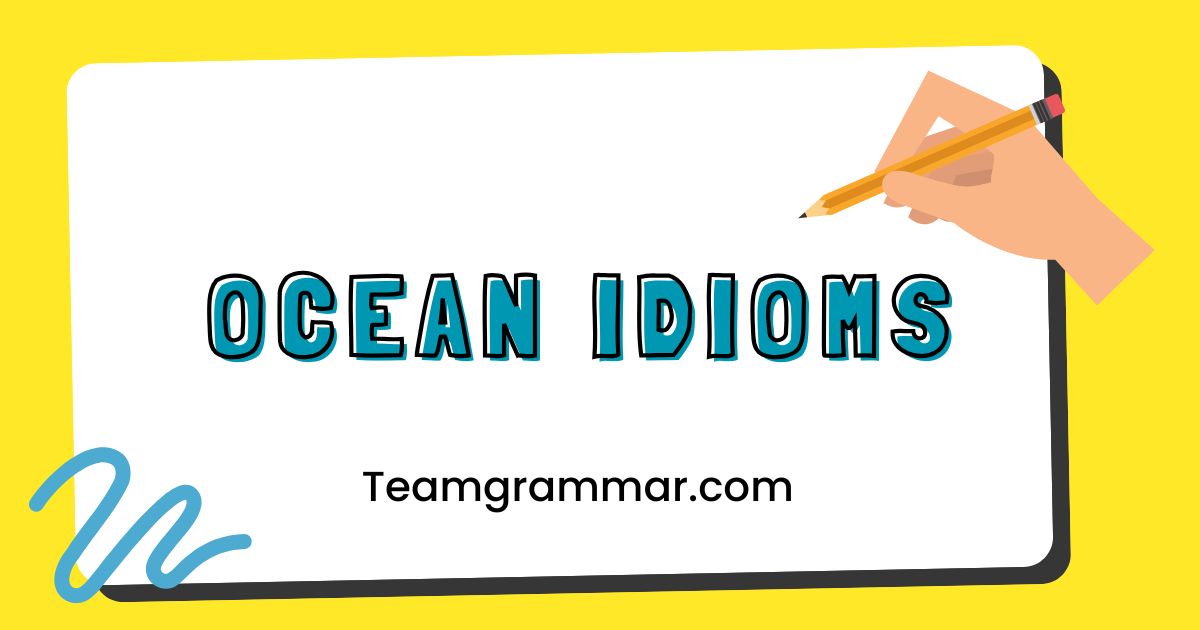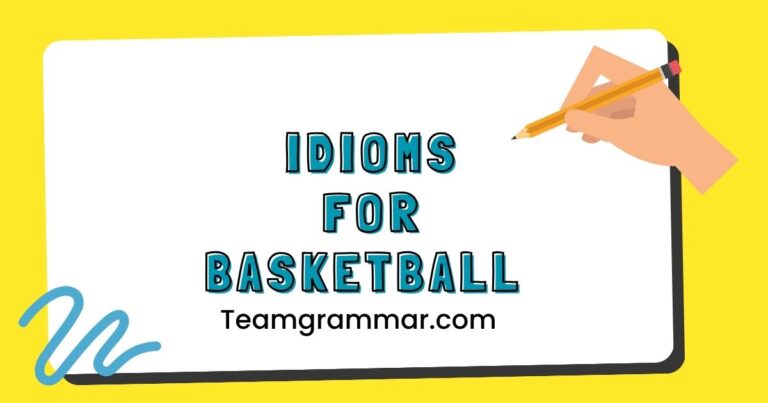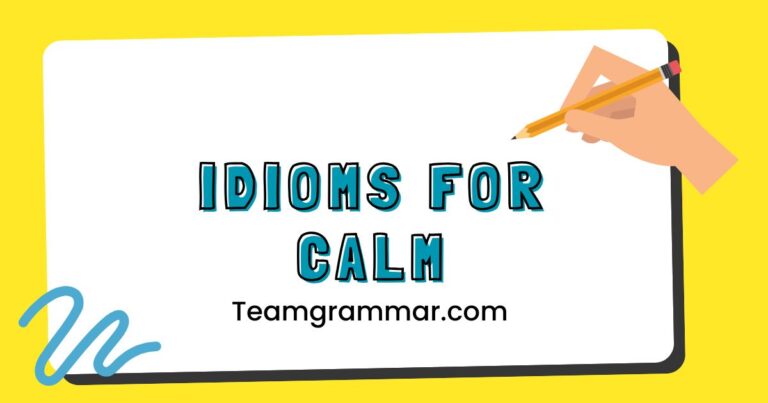39 Ocean Idioms: Mastering Figurative Language of the Sea
Idioms add color and depth to the English language, allowing speakers to express complex emotions and ideas in concise and imaginative ways. Ocean-related idioms are particularly evocative, drawing on the vastness, mystery, and power of the sea to convey a wide range of meanings.
Understanding these idioms is crucial for comprehending nuanced communication and enhancing one’s overall language proficiency. This article will explore the definitions, structures, usage rules, and common mistakes associated with ocean idioms, providing numerous examples and practice exercises to help learners master this fascinating aspect of English vocabulary.
This comprehensive guide is designed for English language learners of all levels, from beginners looking to expand their vocabulary to advanced speakers aiming to refine their idiomatic expression. By the end of this article, you will have a solid understanding of ocean idioms and be able to use them confidently and accurately in your own speech and writing.
Table of Contents
- Definition of Ocean Idioms
- Structural Breakdown of Ocean Idioms
- Types and Categories of Ocean Idioms
- Examples of Ocean Idioms
- Usage Rules for Ocean Idioms
- Common Mistakes with Ocean Idioms
- Practice Exercises
- Advanced Topics in Ocean Idioms
- Frequently Asked Questions (FAQ)
- Conclusion
Definition of Ocean Idioms
An idiom is a phrase or expression whose meaning cannot be understood from the ordinary meanings of the words within it. Instead, the phrase has a figurative meaning that is known through common usage.
Ocean idioms are a subset of idioms that use elements of the ocean – such as the sea, waves, fish, and nautical terms – to convey abstract ideas, emotions, or situations. These idioms often draw on the symbolic associations of the ocean, such as its vastness representing boundless opportunity or its storms representing challenges and difficulties.
Ocean idioms function as a form of figurative language, adding color and nuance to communication. They are frequently used in both spoken and written English to express complex ideas in a concise and memorable way.
The context in which an idiom is used is crucial for understanding its intended meaning. For example, the idiom “in deep water” literally refers to being submerged in water, but figuratively means being in a difficult or problematic situation.
The use of ocean idioms can be traced back centuries, reflecting humanity’s close relationship with the sea. Many of these idioms originated from maritime culture, where sailors and fishermen developed their own unique expressions to describe their experiences and challenges.
Over time, these expressions entered the mainstream language and became widely recognized idioms.
Structural Breakdown of Ocean Idioms
Ocean idioms, like all idioms, do not follow typical grammatical rules for word order or meaning. Their structure is often fixed, meaning that the words within the idiom cannot be changed or rearranged without altering or losing the idiom’s intended meaning.
Understanding the structural elements of ocean idioms involves recognizing their fixed nature and understanding how they function as a single unit of meaning.
Most ocean idioms consist of a combination of nouns, verbs, adjectives, and prepositions related to the ocean. For example, in the idiom “make waves,” the verb “make” combines with the noun “waves” to create a figurative meaning of causing a disturbance or creating an impact.
Similarly, in the idiom “smooth sailing,” the adjective “smooth” describes the noun “sailing” to convey the idea of an easy and trouble-free experience.
The grammatical structure of ocean idioms can vary, but they often follow common patterns such as:
- Verb + Noun: make waves, miss the boat, rock the boat
- Adjective + Noun: smooth sailing, deep water, high seas
- Prepositional Phrase: at sea, in deep water, on the crest of a wave
It’s important to note that the individual words within an ocean idiom do not contribute their literal meanings to the overall meaning of the idiom. Instead, the entire phrase functions as a single semantic unit.
This is what distinguishes idioms from regular phrases or expressions.
Types and Categories of Ocean Idioms
Ocean idioms can be categorized based on the specific aspect of the ocean they relate to or the type of meaning they convey. Here are some common categories:
Idioms Related to Calm Seas
These idioms evoke a sense of peace, tranquility, and ease, often associated with calm waters and favorable conditions.
Idioms Related to Stormy Seas
These idioms convey a sense of difficulty, turbulence, and adversity, often associated with storms, rough waters, and challenging situations.
Idioms Related to the Depth of the Ocean
These idioms often relate to things that are hidden, mysterious, or profound, drawing on the vastness and unknown depths of the ocean.
Idioms Related to Fishing
These idioms often involve the act of fishing or catching fish, and they can be used to describe situations involving luck, opportunity, or risk.
General Ocean-Related Idioms
This category includes idioms that use general ocean-related terms to convey a variety of meanings, often related to vastness, abundance, or change.
Examples of Ocean Idioms
This section provides a comprehensive list of ocean idioms, categorized by theme, with example sentences to illustrate their usage.
Idioms Related to Calm Seas
These idioms describe situations that are peaceful, easy, and without problems. They often use imagery of calm waters and smooth sailing.
The table below provides examples of idioms related to calm seas, their meanings, and example sentences demonstrating their usage.
| Idiom | Meaning | Example Sentence |
|---|---|---|
| Smooth sailing | Easy progress without problems | After the initial challenges, the project was smooth sailing. |
| Plain sailing | Easy and straightforward | Once we had the instructions, it was plain sailing to assemble the furniture. |
| All shipshape | Everything is in order and ready | The house was all shipshape before the guests arrived. |
| A rising tide lifts all boats | Improving economic conditions benefit everyone | The new policies are expected to help small businesses; after all, a rising tide lifts all boats. |
| Steady as she goes | Maintain the current course or pace | Even with the minor setbacks, we need to be steady as she goes to meet our deadline. |
| In calm waters | In a peaceful and stable situation | After the storm, the company was finally in calm waters. |
| Make headway | To make progress, especially when it is difficult | Despite the challenges, they continued to make headway on the project. |
| Following seas | Favorable conditions; assistance | With following seas, the company achieved record profits. |
| Fair winds and following seas | A wish for good luck and smooth journeys | As they embarked on their new venture, we wished them fair winds and following seas. |
| Keep an even keel | Maintain a stable and balanced approach | It’s important to keep an even keel during times of stress. |
| Run a tight ship | To manage something efficiently and strictly | The new manager runs a tight ship, and the team is more productive as a result. |
| On an even keel | Stable and balanced | After the initial turbulence, the relationship was finally on an even keel. |
| A sea of tranquility | A state of perfect calm and peace | The meditation retreat offered participants a sea of tranquility. |
| Sail through something | To succeed very easily in something | She sailed through the exam without any problems. |
| Have a good run | To enjoy a period of success or good fortune | The company had a good run last year, with record sales. |
| Glide along | To proceed smoothly and effortlessly | She glided along in her new role, quickly mastering all the tasks. |
| Cruise along | To proceed without difficulty | The project cruised along once the initial hurdles were cleared. |
| Keep afloat | To survive financially; to manage to continue | Despite the economic downturn, the company managed to keep afloat. |
| Stay the course | To continue doing something until it is finished, even if it is difficult | Despite the challenges, we need to stay the course and see the project through to completion. |
| Go with the flow | To accept things as they are and not try to change them | Sometimes it’s best to just go with the flow and see what happens. |
| In still waters | In a quiet and uneventful situation | After the hectic week, she enjoyed being in still waters at home. |
| A calm sea never made a skilled sailor | Challenges and difficulties help one develop skills and resilience | He embraced the difficult projects, knowing that a calm sea never made a skilled sailor. |
Idioms Related to Stormy Seas
These idioms describe situations that are difficult, chaotic, or full of problems. They often use imagery of storms, rough waters, and turbulent conditions.
The table below provides examples of idioms related to stormy seas, their meanings, and example sentences demonstrating their usage.
| Idiom | Meaning | Example Sentence |
|---|---|---|
| In deep water | In a difficult or problematic situation | He found himself in deep water after making a series of bad decisions. |
| Troubled waters | Difficult or problematic circumstances | The company is currently navigating troubled waters due to the economic downturn. |
| Rock the boat | To cause a disturbance or disruption | He didn’t want to rock the boat by disagreeing with the manager. |
| Weather the storm | To survive a difficult period | The company managed to weather the storm and emerge stronger. |
| High seas | A dangerous or risky situation | The pirates sailed the high seas looking for treasure. |
| All at sea | Confused or uncertain | I’m all at sea with this new software. |
| Adrift | Without direction or purpose | After losing his job, he felt adrift and unsure of what to do. |
| A sea change | A major transformation or shift | The new technology has brought about a sea change in the industry. |
| Sink or swim | To succeed or fail entirely on one’s own | The new recruits were thrown into the project and told to sink or swim. |
| Make waves | To cause a disturbance or create an impact | The new policy is expected to make waves in the community. |
| Capsize | To overturn or be overturned | The boat nearly capsized in the rough seas. (Figuratively: The plan nearly failed.) |
| In the wake of | Following or as a result of something | In the wake of the scandal, the CEO resigned. |
| A tempest in a teapot | A big fuss about a small matter | The argument was just a tempest in a teapot; everyone forgot about it the next day. |
| Between Scylla and Charybdis | Between two equally dangerous situations | He felt like he was between Scylla and Charybdis, unable to make a good decision. |
| Against the tide | Opposing the general trend or opinion | She was swimming against the tide when she argued for the unpopular policy. |
| A drop in the ocean | A very small amount compared to what is needed | The donation was just a drop in the ocean compared to the total cost of the project. |
| The calm before the storm | A period of peace before a disturbance | The quiet morning was just the calm before the storm, as the afternoon brought a series of crises. |
| On the rocks | Experiencing difficulties or likely to fail | Their marriage was on the rocks after a series of arguments. |
| Run aground | To encounter problems or difficulties | The project ran aground when funding was cut. |
| Up the creek without a paddle | In a difficult situation without the means to resolve it | If we miss the deadline, we’ll be up the creek without a paddle. |
| In uncharted waters | In a situation that is unfamiliar and potentially dangerous | The company was venturing into uncharted waters with its new product line. |
| A drowning man will clutch at a straw | Desperate people will try anything to save themselves | He invested all his money in the risky venture, knowing that a drowning man will clutch at a straw. |
| To be in the doldrums | To be in a state of inactivity or stagnation | The team was in the doldrums after the project’s cancellation. |
Idioms Related to the Depth of the Ocean
These idioms evoke a sense of mystery, hidden meaning, or profound understanding. They often use imagery of the deep sea and its hidden depths.
The table below provides examples of idioms related to the depth of the ocean, their meanings, and example sentences demonstrating their usage.
| Idiom | Meaning | Example Sentence |
|---|---|---|
| The tip of the iceberg | Only a small part of a larger problem | The reported issues are just the tip of the iceberg; there are many more problems beneath the surface. |
| A sea of faces | A large crowd of people | The speaker looked out at a sea of faces in the audience. |
| Fathom | To understand or comprehend | I can’t fathom why he would do such a thing. |
| Plumb the depths | To explore or understand something deeply | The researcher sought to plumb the depths of human consciousness. |
| Cast a wide net | To include many possibilities or options | We need to cast a wide net in our search for qualified candidates. |
| Worlds apart | Very different or distant | Their lifestyles are worlds apart. |
| Out of your depth | In a situation that is too difficult for you to handle | He was clearly out of his depth in the advanced mathematics class. |
| Bottomless pit | A situation in which it seems impossible to satisfy someone’s needs | Funding the project felt like pouring money into a bottomless pit. |
| Submerged | Hidden or not easily seen | Her feelings of sadness were submerged beneath a cheerful facade. |
| Deep-seated | Firmly established and difficult to change | The prejudice was deep-seated in the community. |
| A deep dive | A thorough and comprehensive examination | We need to take a deep dive into the data to understand the trends. |
| In the depths of despair | In a state of extreme sadness and hopelessness | After the loss, he was in the depths of despair. |
| Deep pockets | Having a lot of money | The investor has deep pockets and can fund the entire project. |
| Run deep | To be strongly felt or deeply rooted | The emotions run deep within the community. |
| A sea of troubles | Many problems or difficulties | He was facing a sea of troubles after losing his job and home. |
Idioms Related to Fishing
These idioms often involve the act of fishing or catching fish and are used to describe situations involving luck, opportunity, or risk.
The table below provides examples of idioms related to fishing, their meanings, and example sentences demonstrating their usage.
| Idiom | Meaning | Example Sentence |
|---|---|---|
| Fishy | Suspicious or questionable | Something about his explanation seemed fishy. |
| Hook, line, and sinker | Completely believing a lie or deception | He fell for the scam hook, line, and sinker. |
| A big fish in a small pond | An important person in a small community | He was a big fish in a small pond until he moved to the city. |
| Have other fish to fry | To have more important things to do | I can’t help you with that right now; I have other fish to fry. |
| Like shooting fish in a barrel | Very easy | The game was like shooting fish in a barrel; we won easily. |
| Fishing for compliments | Trying to get people to say nice things about you | She was clearly fishing for compliments when she asked if her dress looked nice. |
| Neither fish nor fowl | Not easily categorized | The project was neither fish nor fowl; it didn’t fit into any existing category. |
| A fine kettle of fish | A mess; a difficult situation | This is a fine kettle of fish we’ve gotten ourselves into. |
| Land a big one | To achieve a great success; to obtain something valuable | He landed a big one when he secured the contract with the major client. |
| Let someone off the hook | To release someone from a responsibility or obligation | The judge let him off the hook due to lack of evidence. |
General Ocean-Related Idioms
This category includes idioms that use general ocean-related terms to convey a variety of meanings, often related to vastness, abundance, or change.
The table below provides examples of general ocean-related idioms, their meanings, and example sentences demonstrating their usage.
| Idiom | Meaning | Example Sentence |
|---|---|---|
| Go overboard | To do something excessively | He went overboard with the decorations for the party. |
| Miss the boat | To miss an opportunity | He missed the boat by not investing in the company earlier. |
| On the crest of a wave | At the peak of success or popularity | The band was on the crest of a wave after their new album was released. |
| By and large | Generally; on the whole | By and large, the project was a success. |
| Learn the ropes | To learn how to do something | It takes time to learn the ropes in a new job. |
| Any port in a storm | In a difficult situation, any solution is welcome | I didn’t really like the job, but it was any port in a storm after being unemployed for so long. |
| Three sheets to the wind | Very drunk | He was three sheets to the wind after the party. |
| Give a wide berth | To avoid someone or something | I’d give that company a wide berth; they have a bad reputation. |
| Run before the wind | To move quickly and easily | The project ran before the wind once the funding was secured. |
| Touch base | To make contact with someone | Let’s touch base next week to discuss the project’s progress. |
| Ship out | To depart or send something | The goods will ship out tomorrow. |
| Close to the wind | Operating near a limit or boundary | The company was sailing close to the wind with its risky investments. |
| A sea dog | An experienced sailor | The old man was a true sea dog, having spent his life on the ocean. |
Usage Rules for Ocean Idioms
Using ocean idioms correctly requires understanding their specific meanings and the contexts in which they are appropriate. Here are some key usage rules to keep in mind:
- Context is Key: Always consider the context of the conversation or writing to ensure that the idiom fits the situation and conveys the intended meaning.
- Audience Awareness: Be mindful of your audience and their familiarity with idioms. Avoid using obscure or unfamiliar idioms that may confuse your listeners or readers.
- Formality: Ocean idioms, like other idioms, are generally more appropriate for informal or conversational settings. Avoid using them in formal writing or presentations unless you are certain they are appropriate.
- Grammatical Structure: While idioms themselves don’t follow standard grammatical rules, the way they are used in a sentence should be grammatically correct. Ensure that the idiom fits seamlessly into the sentence structure.
- Avoid Overuse: While idioms can add color and flair to your language, overuse can make your speech sound unnatural or contrived. Use them sparingly and purposefully.
- Literal vs. Figurative: Always remember that idioms are figurative expressions, not literal descriptions. Avoid interpreting them literally, as this can lead to misunderstandings.
- Cultural Sensitivity: Be aware that some idioms may have different connotations or meanings in different cultures. Avoid using idioms that may be offensive or inappropriate in certain contexts.
Common Mistakes with Ocean Idioms
Using ocean idioms incorrectly can lead to confusion or miscommunication. Here are some common mistakes to avoid:
- Literal Interpretation: Interpreting an idiom literally instead of understanding its figurative meaning.
- Incorrect: “He was literally in deep water after the flood.” (Should be used figuratively)
- Correct: “He was in deep water after losing all his money.”
- Incorrect Word Choice: Using the wrong words within an idiom, altering its meaning.
- Incorrect: “He rocked the ship.” (Should be “He rocked the boat.”)
- Correct: “He rocked the boat with his controversial ideas.”
- Misunderstanding Connotations: Not grasping the emotional or cultural associations of an idiom.
- Incorrect: Using “all at sea” to describe someone who is simply relaxed. (It implies confusion)
- Correct: “He was all at sea trying to understand the instructions.”
- Overusing Idioms: Using too many idioms in a short space, making the language sound unnatural.
- Incorrect: “After the project ran aground, we were all at sea, but we weathered the storm and kept afloat.” (Too many idioms)
- Correct: “After the project ran into difficulties, we managed to overcome the challenges and stay on track.”
Practice Exercises
Test your understanding of ocean idioms with these practice exercises. Choose the correct idiom to complete each sentence.
| Question | Answer |
|---|---|
| 1. After the initial setbacks, the project was _____. | smooth sailing |
| 2. He found himself _____ after making a series of poor decisions. | in deep water |
| 3. She didn’t want to _____ by disagreeing with the manager. | rock the boat |
| 4. The company managed to _____ during the economic downturn. | weather the storm |
| 5. I’m _____ with this new software; I can’t figure it out. | all at sea |
| 6. The new technology has brought about _____ in the industry. | a sea change |
| 7. Something about his explanation seemed _____. | fishy |
| 8. I can’t help you right now; I _____. | have other fish to fry |
| 9. He _____ with the decorations for the party; it was excessive. | went overboard |
| 10. He _____ by not investing in the company earlier. | missed the boat |
Exercise 2: Fill in the Blanks
Complete the following sentences with the appropriate ocean idiom.
| Question | Answer |
|---|---|
| 1. The reported issues are just _____ of the problem; there’s more beneath the surface. | the tip of the iceberg |
| 2. The speaker looked out at _____ in the audience. | a sea of faces |
| 3. I can’t _____ why he would do such a thing. | fathom |
| 4. He fell for the scam _____. | hook, line, and sinker |
| 5. We need to _____ in our search for qualified candidates. | cast a wide net |
| 6. After losing his job, he felt _____ and unsure of what to do. | adrift |
| 7. Their lifestyles are _____. | worlds apart |
| 8. We need to _____ next week to discuss the project’s progress. | touch base |
| 9. Despite the economic downturn, the company managed to _____. | keep afloat |
| 10. The new manager _____ and the team is more productive as a result. | runs a tight ship |
Exercise 3: Meaning Matching
Match each idiom with its correct meaning.
| Idiom | Meaning |
|---|---|
| 1. All shipshape | a. In a difficult situation |
| 2. Run aground | b. Easy and straightforward |
| 3. Plain sailing | c. Avoid someone or something |
| 4. Give a wide berth | d. Everything in order and ready |
| 5. Up the creek without a paddle | e. Encounter problems or difficulties |
Answers: 1-d, 2-e, 3-b, 4-c, 5-a
Advanced Topics in Ocean Idioms
For advanced learners, exploring the etymology and historical context of ocean idioms can provide a deeper understanding of their meanings and usage. Researching the origins of idioms like “three sheets to the wind” or “sink or swim” can reveal fascinating insights into maritime history and culture.
Another advanced topic is the use of ocean idioms in literature and popular culture. Analyzing how authors and filmmakers use these idioms to create vivid imagery, convey complex emotions, and develop compelling narratives can enhance your appreciation of the English language and its expressive capabilities.
Additionally, exploring the cross-cultural variations of ocean idioms can broaden your understanding of linguistic diversity and cultural differences. Some idioms may have direct equivalents in other languages, while others may be unique to English.
Comparing and contrasting these idioms can provide valuable insights into the way different cultures perceive and express ideas related to the ocean.
Advanced learners might also delve into the nuances of using ocean idioms in different registers of English, such as formal vs. informal, or academic vs. colloquial. Understanding how the choice of idioms can affect the tone and style of your writing or speech is crucial for effective communication.
Frequently Asked Questions (FAQ)
- What is the difference between an idiom and a metaphor?
An idiom is a phrase whose meaning is not predictable from the usual meanings of its constituent elements, while a metaphor is a figure of speech that directly compares two unlike things. Idioms are often fixed expressions, whereas metaphors can be more flexible and creative. For example, “in deep water” is an idiom meaning “in trouble,” while “the sea of life” is a metaphor comparing life to the sea.
- Why is it important to learn idioms?
Learning idioms is crucial for understanding native English speakers and for expressing yourself more naturally and fluently. Idioms add color and depth to your language, allowing you to convey complex ideas and emotions in a concise and memorable way. Without a knowledge of idioms, you may misinterpret what others are saying or struggle to express yourself effectively.
- How can I improve my understanding of idioms?
There are several ways to improve your understanding of idioms. Read widely in English, paying attention to how idioms are used in context. Listen to native English speakers and try to identify idioms in their speech. Use a dictionary of idioms to look up unfamiliar phrases. Practice using idioms in your own speech and writing. The more you expose yourself to idioms, the better you will become at understanding and using them correctly.
- Are idioms the same in all English-speaking countries?
No, idioms can vary between different English-speaking countries and regions. Some idioms may be unique to a particular country or region, while others may have different meanings or connotations in different places. For example, some idioms used in British English may not be common or well-understood in American English, and vice versa. It’s important to be aware of these regional variations when using idioms.
- Can I create my own idioms?
While it’s technically possible to create your own idioms, it’s generally not recommended. Idioms gain their meaning through common usage and widespread recognition. If you create a new idiom, it’s unlikely that others will understand it or use it in the same way. It’
s better to stick to established idioms that are already recognized and understood by native English speakers.
Conclusion
Ocean idioms offer a rich and evocative way to express complex ideas and emotions, drawing on the imagery and symbolism of the sea. By understanding their definitions, structures, usage rules, and common mistakes, English language learners can master this fascinating aspect of the language and enhance their overall communication skills.
Through practice and exposure to a variety of contexts, learners can confidently incorporate ocean idioms into their speech and writing, adding color, depth, and nuance to their expression. This comprehensive guide has provided a solid foundation for mastering ocean idioms, and with continued effort and dedication, learners can unlock the full potential of this expressive and imaginative aspect of the English language.







